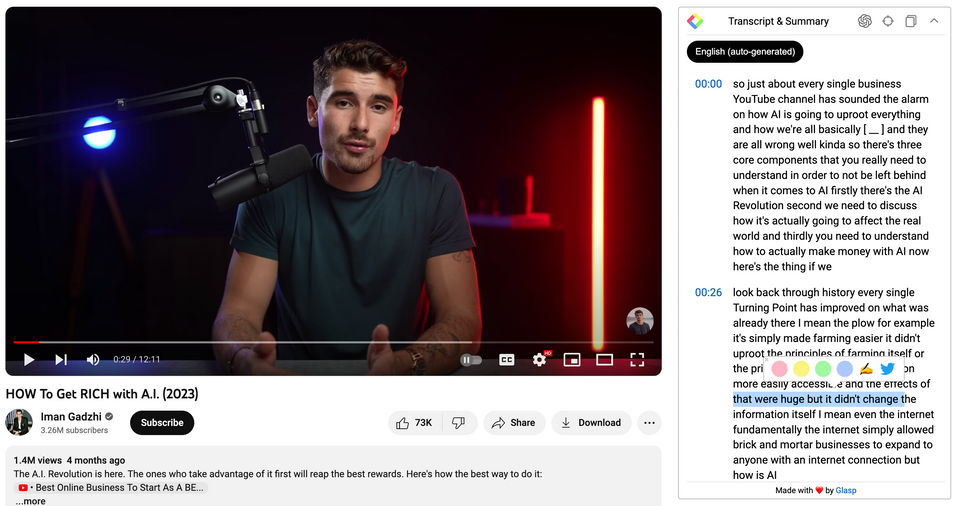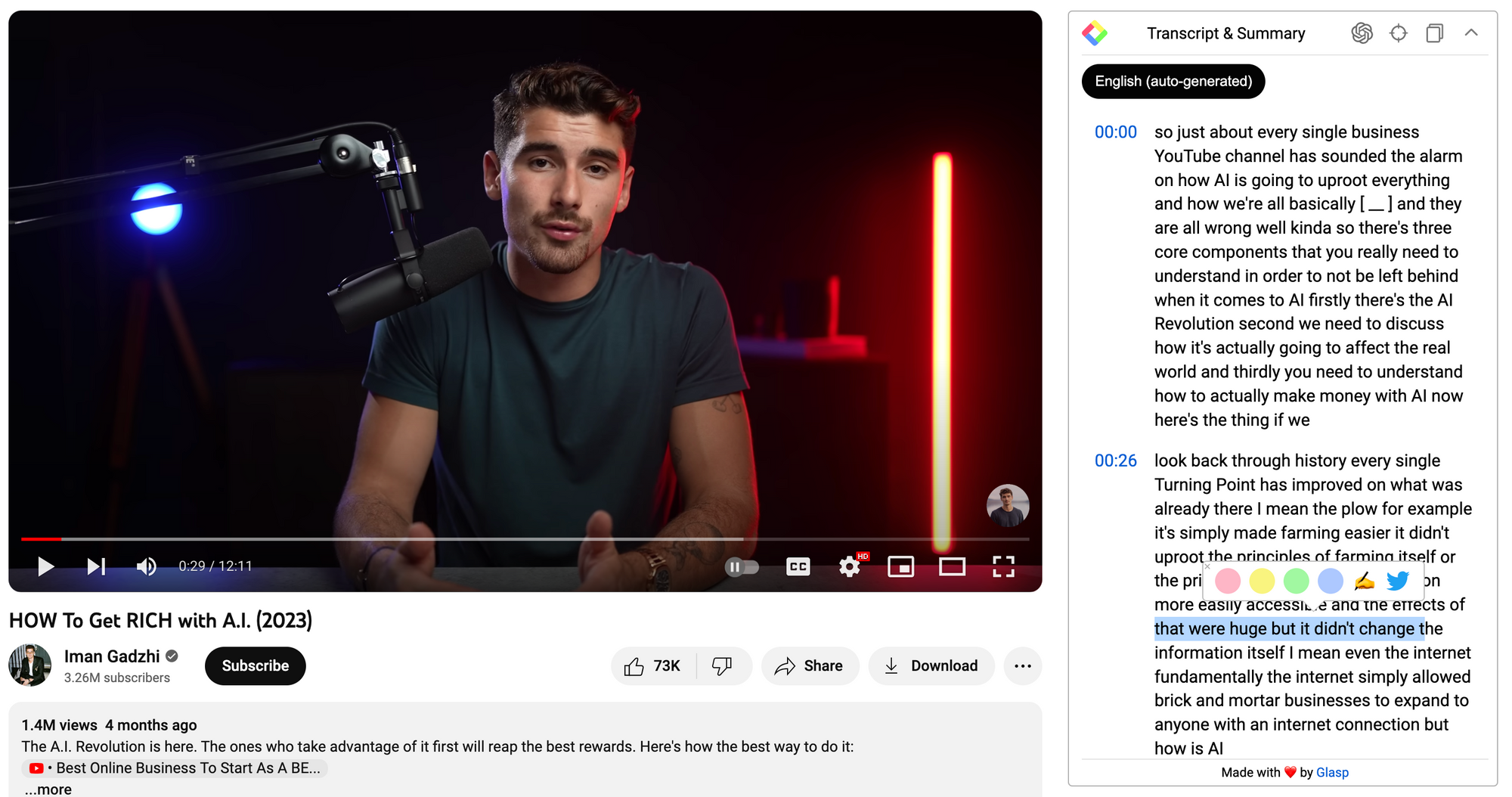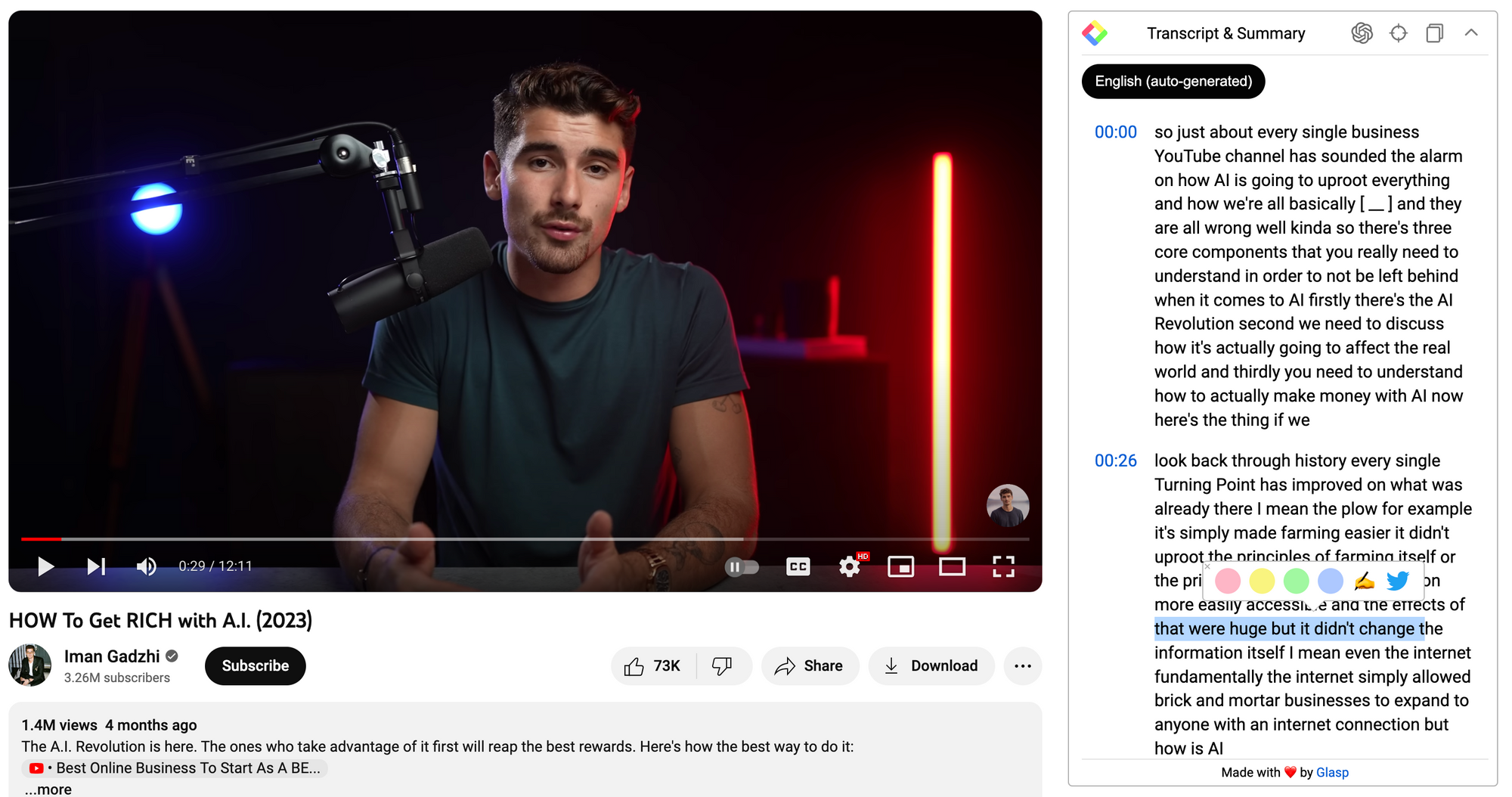Iman Gadzhi - HOW To Get RICH with A.I. (2023): Summary and Q&A

Introduction
In an era where artificial intelligence (AI) is reshaping industries, many fear being left behind or rendered obsolete. This video delves into the heart of the AI revolution, debunking common myths and highlighting tangible ways to harness its potential. Join us as we uncover the secrets to thriving amidst the rapid advancements of 2023's digital landscape.
Summary
- Understanding AI's Significance: AI is revolutionizing industries, making certain roles obsolete while offering tremendous opportunities. It productizes skills that were unique to humans. AI's rapid advancement, paired with the concept of Moore's Law, means its capabilities are growing exponentially.
- Real-World Implications of AI: AI is showing potential in areas previously thought to be exclusively human, like creativity. AI has won art competitions and is being used in fields like medicine. It's essential to differentiate between the short-term and long-term effects of AI.
- Making Money with AI:
• Agency Use: AI can streamline communications (e.g., auto-generating emails), reducing manual work. This allows business owners to focus on growing their businesses.
• Content Creation: AI can assist content creators by providing unlimited ideas, structuring content, and even assisting in areas like photo editing.
• Consultancy & Coaching: AI tools can transcribe notes, generate presentations, and perform analyses, allowing consultants to focus more on fostering relationships. - Adapting to AI: The key to thriving in an AI-dominated world is the speed of adaptation. While AI offers the tools to augment work, human laziness and resistance to change can be barriers.
- The Human Touch Remains Vital: Despite AI's advancements, the uniquely human qualities, especially in relationship-building, will remain irreplaceable. The onus is on individuals to capitalize on AI while complementing it with their human attributes.

Q&A
Q: How is AI changing the current business landscape?
A: AI is revolutionizing business by productizing something previously unique to humans: skill. While AI has been around for years, democratized tools like ChatGPT have made it accessible to everyone. AI's rapid advancement, paired with technological growth, offers limitless opportunities, transforming sectors like content creation and consulting, making processes more efficient, and introducing new ways to leverage human skills.
Q: What makes AI different from previous technological advancements?
A: Historical innovations, like the plow or printing press, improved on existing systems. AI, however, is different as it productizes human skill, doing tasks that were once exclusively human. For the first time, we're seeing AI surpass human capability in areas like creativity.
Q: How has the perception of AI's impact on job sectors changed over time?
A: Initially, many believed AI would first replace physical labor, then white-collar jobs, and lastly, the creative industry. However, recent developments show this order reversed. AI is now challenging human creativity, with examples like winning fine arts competitions.
Q: Why is there concern about AI's governance and potential threats?
A: AI presents both immense opportunities and challenges. Prominent leaders and experts, including the CEO of OpenAI, have expressed concerns about the potential dangers of unchecked AI, highlighting the potential risks of AI misuse.
Q: Which industries are already feeling AI's impact?
A: AI is already impacting content creation, consulting, and medical fields. We've seen AIs win creative competitions and there's an increasing reliance on AI tools in the medical, content, and consulting sectors. AI's ability to streamline tasks and improve efficiency is making waves across various industries.
Q: How can businesses leverage AI to their advantage?
A: Businesses can harness AI for tasks like communication, content creation, and data analysis. For example, agencies can automate email writing, content creators can generate ideas, and consultants can use AI for presentations or Excel analyses. AI offers a new form of leverage, enabling businesses to do more with less.
Q: What is the role of humans in this AI-driven world?
A: Humans remain crucial for the "final touch". AI can generate content, diagnose ailments, or draft communications, but a human touch ensures quality, relatability, and genuineness. Additionally, fostering relationships and strategic decision-making are uniquely human qualities that remain invaluable.
Q: How does AI affect content creation?
A: AI can help overcome creative blocks by providing unlimited ideas. Writers can use AI to structure their work, while tools are emerging that allow photo editing through simple text commands. The potential for AI in video editing and other creative realms is vast, offering tools to streamline the process.
Q: How are tech giants incorporating AI into their product suites?
A: Microsoft, for example, has introduced an AI tool called "copilot" that streamlines workflows by automating tasks like note transcription, presentation creation, and data analysis. Such integrations show how AI is becoming an essential part of mainstream software suites.
Q: What's the main takeaway for individuals and businesses navigating this AI revolution?
A: The key is adaptation. Embracing AI as a tool to complement human skills, not replace them, can lead to unprecedented growth and efficiency. Whether an entrepreneur, employee, or content creator, understanding and integrating AI will determine success in the digital age of 2023.
Before you leave

